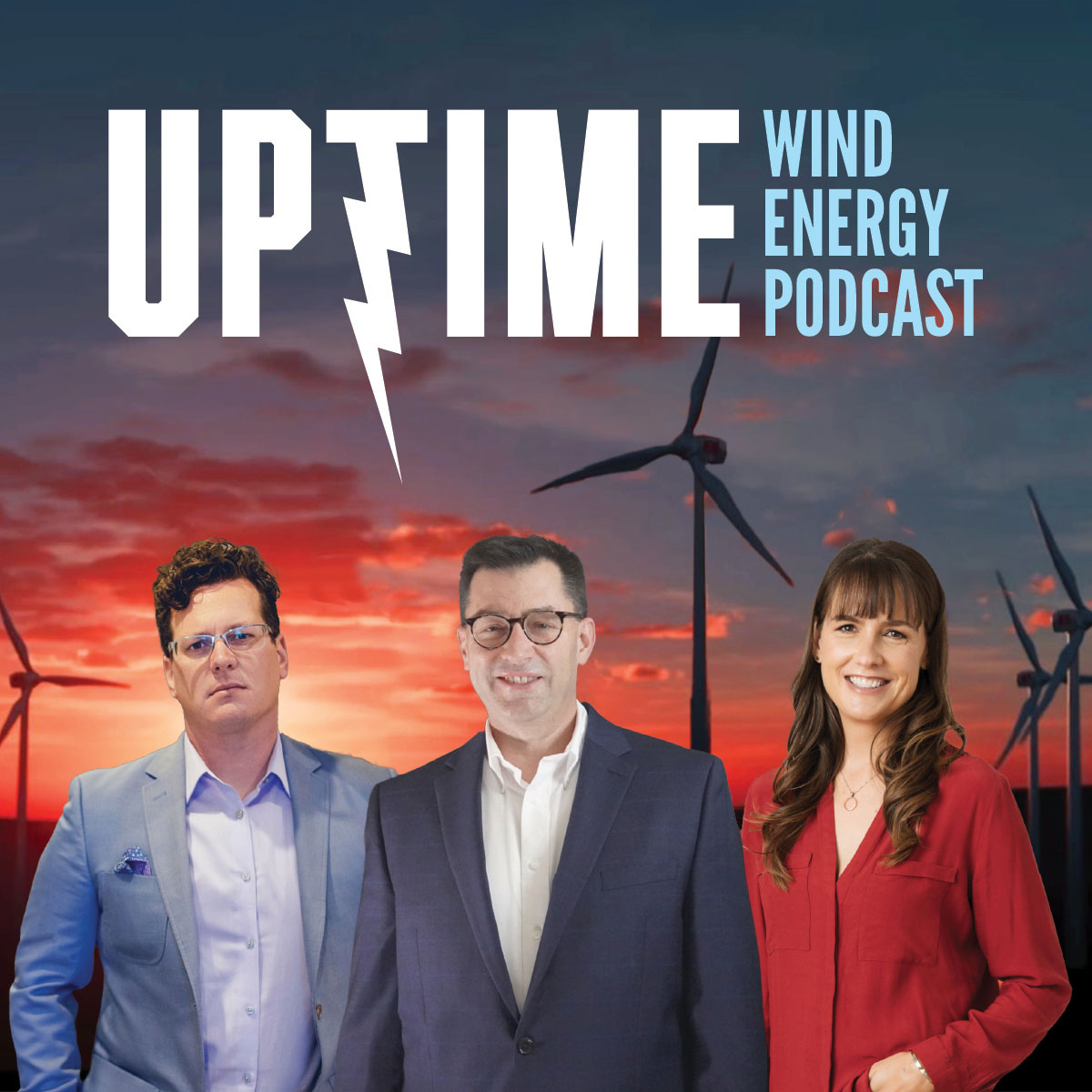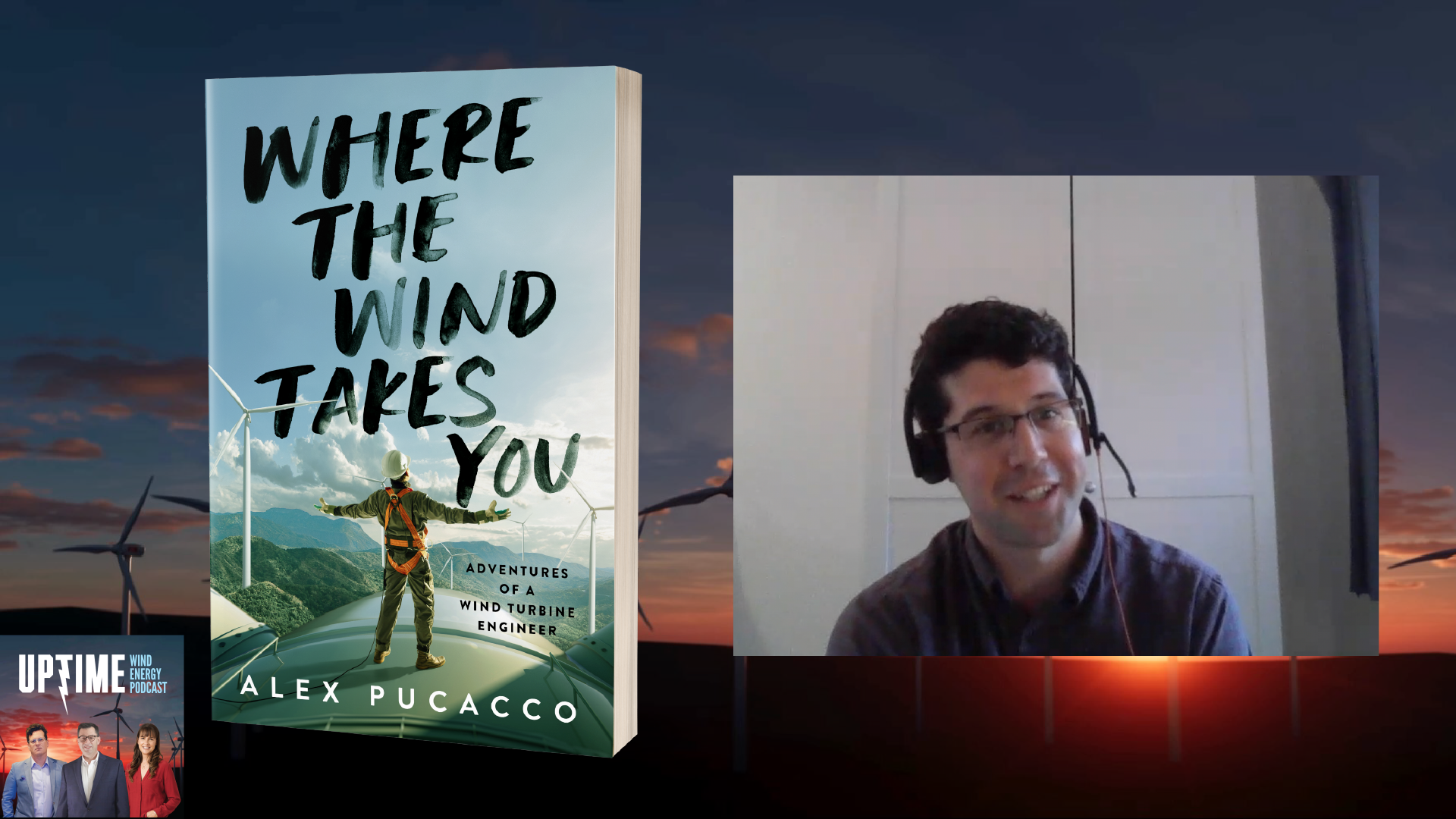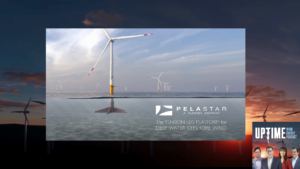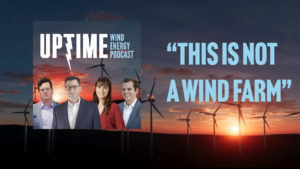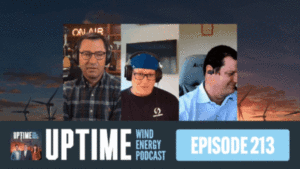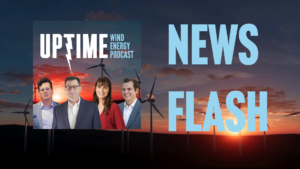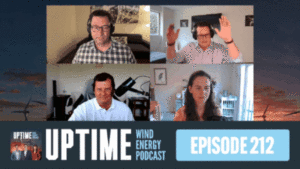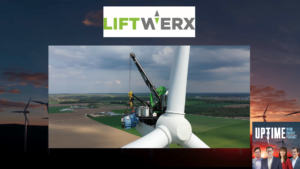Podcast: Play in new window | Download
Allen and Joel chat with Alex Pucacco, an engineer in the wind industry, about his new book, “Where the Wind Takes You: Adventures of a Wind Turbine Engineer”. The book shares real-life stories and anecdotes from Alex’s 10+ years working as a wind turbine technician and engineer, set in the days of the “Wild West” in wind. It follows an apprentice wind tech named Aaron as he tries to get experience in the industry. Each chapter features trips to different wind farms around the world where Aaron encounters colorful characters and gets into humorous scrapes and mishaps while working on turbines. Tales of issues like missing tools, breaking down vehicles, and adventures at local hotels highlight the lifestyle of constantly traveling techs. If you’re looking for a holiday gift for your wind industry friends, this is it!
Buy the book!
Alex’s Website: https://windyproductions.com/product/where-the-wind-takes-you/
Amazon: https://a.co/d/9xiMHLN
Allen Hall: Our guest is author Alex Pucacco. Alex is based in Nottingham, England, and is an engineer by training, working in the wind industry since 2011. Alex is the author of a brand new book about being a wind turbine technician and engineer. It’s called “Where the Wind Takes You: Adventures of a Wind Turbine Engineer”.
Alex, welcome to the program.
Alex Pucacco: Thanks for having me. Appreciate it.
Allen Hall: So there’s very few books about being a wind turbine technician or engineer in the field. Yours is interesting because it’s based on real life experiences. And I know you’ve changed the names to protect the innocent quote unquote, innocent, right?
It’s, but it’s really based upon on some level, your interactions and working in winds, you’ve been in wind over 10 years. And you went through some of the, what I would call early times in wind, when wind started to become big. And Scotland and it looks like most, mostly Scotland early on, at least some of the book is about that.
I want to hear some of the details, like how did you get into wind? Why did you get into wind? What was some of those early experiences because there’s a that at that time it was a difficult industry to get into.
Alex Pucacco: It was and I think it still is to a degree and as I would say it’s better to be lucky than smart. I did I wouldn’t say mine is a conventional route. And I think since releasing the book a lot of people have approached me to ask desperate to get into wind, what’s the best way? So I guess in repayment for that I have I’m putting together an article at the moment to help young people get into wind because it is very competitive and difficult despite us crying out for more technicians. So yeah, I did a engineering degree at the University of Nottingham, which was completely useless.
Didn’t pick up a spanner in the entire time. Graduated into a recession ended up working for a small UK manufacturer of off grid wind turbines, the tiny ones on the back of boats. Did a bit of residential solar for a bit, and then I went to California Wind Tech, which was like a two month course they did in California, just as an introduction to electrical and hydraulic schematic reading, and then I got a real lucky break.
I applied for a salesy operations job, which was a real sort of dog’s body type role. And they gave me a chance at a wind turbine gearbox consultancy that was just starting up in wind. A load of people had left on maternity leave. We didn’t have enough people. And, we had more work than we could deal with.
So very often there’d be a shout around the office, who wants to go to Australia, America, Scotland, to do whatever job it was, main bearing inspection, portable vibration demonstration, something like that. Stick my hand up. Yeah, I’ll go. Get yourself booked. You travel. Off you go. And that was it.
You were gone for two, three weeks. And it was fantastic. I was very lucky.
Joel Saxum: So this must have been before kids and wife, right?
Alex Pucacco: Yes, this was yeah, this was very much before B. C., as they say, before children. So I’ve got two young kids now. So those days of carefree travel without permission slips, signed, sealed and delivered very much before that time.
But I think that’s true of a lot of people’s experiences within wind is that especially if they work for OEMs, where they do a lot of travel, the story of the traveling technician is a very frequent one. And how they progress into sort of working at a particular wind farm or getting two feet across where they get employed by the wind farm owner.
So it’s a fairly familiar journey, and then they progress design manager, et cetera. So as I traveled around these places, visiting different wind farm site owners, lead technicians, everybody that worked in wind all over the world, I started getting talking to them, ask about their back story and usually you could get them go in telling stories quite easily and as somebody that get bored and there’s a lot of dead time and waiting around in wind as anybody knows.
Whether it’s for a boat or, for wind or weather or parts there’s loads of waiting. So you can usually get people talking and understandably quite a lot of the subject matter within the book, where the wind takes you is about going to the toilets and those idle hours. Spent talking absolute nonsense, pranks, getting into shenanigans, crashing pool cars, everything you would expect of unsupervised men alone, a hundred meters up in the air uh, ex squaddies, obviously they’ve got a very interesting approach to work great sense of humor.
So it’s. It’s a very male orientated book, I’m sorry to say, although there are female characters in it. But because of that, a lot of the humor is very male. So it’s very good value for that. There are 11 chapters in here, which are essentially each of them is a trip to a different wind farm in a different country.
And it follows the journey of Aaron, who is a wind turbine apprentice, him trying to get his feet on the rung of the of the wind industry. As he progresses, as he his way through every scenario because he doesn’t know what he’s doing. And just him desperately trying to blag any type of competence or perceived competence.
As he figures out what it is he’s supposed to be doing. And all the colourful characters that he meets in wind turbines, completely unsupervised and alone. It’s really his journey. But a lot of the stories, whilst the places are real, the people are real, it’s all based on my experience. A lot of the stories, especially the anecdotes, are borrowed.
They’re all true, 100 percent true. And I think that’s what I really enjoy about the book is that these are all real people. And I think that some of the best feedback I’ve had from either the people who have donated stories or the people who have read it, have they said it’s very true to form.
It’s relevant. It’s a representation of their life. And they can pick out not so much the people, because as we say, we’ve anonymized everybody to protect everyone. There’s still people, some of them in very senior corporate positions now that have contributed to this book. And and they’re all here and they’re all very recognizable.
Even if they don’t know the particular person, they will know someone like them, I would guess.
Allen Hall: It’s a real life look into wind industry of that time. And I think that’s what’s fascinating about it because it’s was difficult. Everything about it was difficult. Running around in a van, a couple of guys in a van with a bunch of tools into a muddy field or icy field climbing wind turbines turning over sheep that have flipped over in the field and yikes.
Alex Pucacco: It’s I mean it’s very easy to be unprepared because the nature of wind is very changeable. Anyway, when you couple that with the facts, you’re trying to maintain a turbine where all of the paperwork you’ve got is beg, borrowed, and steeled. The tooling is modified ad hoc, it’s, you have to be incredibly adaptable at the same time squeaky clean from a health and safety perspective and it’s completely impossible.
Allen Hall: Speaking of squeaky clean, a lot of the book is about everybody being dirty. Or greasy. Covered in mud. At that time, that’s what, that’s how it was. It was a very unregulated, so to speak, industry. Things needed to get done. So it took tough people to, to get it done. And that’s the thing that stands out about the book.
Alex Pucacco: Yeah, it is the wild west. I like, there are some stories in here which go all the way back to sorts of, the engineering hippie days of the late eighties where, lattice towers, everything else. So there are, even though most of the story is based on the two megawatt platform, the sort of early to 2010 3s, this type of thing. He’s, there’s a real span in there. And despite us having the wind turbine safety rules now and, we know better and everything’s in the spotlight. We have oil and gas and some very established financial players at the scene, especially in offshore.
It’s still the Wild West, what happens up tower still stays up tower, and there’s a very, there’s a very big gap between those that finance and those that maintain and I think the stories still keep coming. I was worried, especially now the introduction of turbine toilets into sort of some of the newer machines.
That’s the end of it. There’s no more good stories to come, but good to hear that even on the Hallye platform, absolutely covered, it’s got more CCTV in that 15 megawatt turbine than the City of London. Still no toilets. So it just means that when you are going to the toilet, you put your thumbs up to everybody at Marine Coordination who’s looking at it.
So it’s we’re still not learning our lesson, still reinventing the wheel. And I think that’s part of the fun of working in wind.
Joel Saxum: There’s a major difference that you see between the the shiny, clean exterior that, that the, is portrayed in branding or marketing or in the media or whatever, and what’s really happening.
If you look at a technician’s phone and his videos and stories and things that are going on there look at this one. Look, we were installing this tower before it had, the viv protection under something and the towers up there swinging them a meter per second. There’s guys holding on up there and stuff like, so there’s a lot of things that happen behind the scenes.
And I think the book dives into those stories and gives it gives a. Almost like a picture of what’s really happening under the hood of this vehicle out in the field.
Alex Pucacco: Yes, very much. And I think I think that’s where the most fun is had, I think as well as where the, as the old saying goes, if you want a clean paycheck, you need dirty hands.
And some of my stories are just the sheer silliness of it. And this story I’m about to tell isn’t actually in the book, but it’s it’s from a Siemens 2. 3. So it’s got these lovely sort of clamshell nacelle. Open roofs where you’ve got like it, so you’ve got a complete vista either way and what a couple of technicians did was that they worked it out, they measured it up and they strung up hammocks between the top of the clamshells.
And beautiful sunny day. So stripped off to their boxers. Lunchtime, they’re ahead in service. It’s a very slow day. So they’re lying there in the sunshine, reading a book. You’re drinking their cups of tea. And then one of them gets up and he sees the other guy’s
clothes and he just launches his clothes over the side of the clamshell. So he stood up there, just in his pants. So it, as a kind of act of revenge, the guy gets out of his hammock and he throws his mate’s clothes over the side as well. So they’re both standing there with their boxes and they’re laughing, obviously they’re just boys, they’re being silly.
And so they finished the day’s work, beautiful sunshine, 25 degrees, late eighties, American money. And they think okay, put their harnesses on. So they’ve got just their pants, they’ve got their harnesses on. So it looks like they’re wearing bondage and they climb, the climb down tower. And they step out into the field and they come across this border collie and they’re like, what’s he got in his mouth? So the border collie’s got this guy’s t shirt in his mouth. And this farmer comes out of nowhere and he’s Hey there. And they, and this farmer clocks these two semi naked blokes stepping out from the tower door and he just looks at them and he just shakes his head.
And the, it’s, as you say, it’s where else could you do that?
Allen Hall: For anybody that’s worked in wind, For any length of time, being in a car or a van or a truck is just part of that lifestyle because you spend so many hours in there. And that’s a great deal about the book. There’s two places where the technicians are spend a good bit of time.
In a vehicle stuck or trying to get a wounded vehicle back to the hotel. And then the second is the hotel that how many nights you spend away from home and the different crazy places you end up spending a hotel night. And UK hotels are a lot different than American hotels. There’s a lot. They are more integrated into the fun part of life is built into the hotel.
It’s not just a sleeping space. So it’s more of a relaxation space too. You want to talk to what those experiences were and how much time you actually spend in a car. Some of the adventures in those that happen in those places.
Alex Pucacco: Yeah, sure. Inevitably a huge part of the job is travel and in your twenties is fantastic because you’re partying around the world on the company dime, which, can you really put a price on that?
But in the UK, all of our wind farms, they’re fairly remote. It’s not like Texas or Australia where you’ve got fairly hubs, if you will, and lot larger populations as well. So you’re looking, you’re thinking rural Wales, rural Scotland, and some of the places that you stay have a lot of how we say character.
So usually there’s one person in the pub that does front desk. Cooks the meals, serves the drinks, turns the beds. And you’re there for two or three weeks stinking up the
place. And if, and if there’s two or three of you or six or 10 of you on a job, you descend and take over this whole establishment, like it’s your house for the week, basically.
And especially some of the more, shall we say, testosterone, and, the more blokes you get in one space, the more ridiculous it becomes. Because you’re always pitching to the lowest common denominator. I think that’s, a lot of it is about male camaraderie. Drinking far too much on a school nights.
Yeah, that type of thing. But yeah, the travel aspect as well cultural observations as somebody that had not seen much of the world before working in wind, uh, going to Australia and observing for the first time that no, actually the wind turbines do spin in the same direction. It’s still, still a wind turbine.
Desperately trying to walk and walk whilst not being able to talk the talk. And I think that’s what Most people enjoy is that everybody was new once and this is very much somebody that was just starting in wind. And we were not just within wind at the time, but the company that was working for as well.
We were making up as we went. And I just could not imagine doing that now, especially when you consider the size of the companies that operate these wind farms absolutely huge utilities. And you’ve got a bunch of chances just walking in and just but yeah I don’t know, I’d like to think we have matured and some of that stuff which happened then wouldn’t happen now, but yeah, it still happens definitely.
Allen Hall: The other thing that stood out was the number of times you’re looking for tools, particularly sockets, that there’s always a missing socket and you find tools in the most, in the weirdest places. We want to talk about some of those situations.
Alex Pucacco: Yeah, it’s the classic meme of the lost 10 mil socket, and I think Aaron actually finds one during one of the stories, which is just goes to show how lucky he is.
But yeah, misplaced tools. The main tool of my trade was was an endoscope, which was an incredibly unreliable piece of kits because they were supposed to be designed for more. Inspecting squeaky clean off the production line, Rolls Royce jet engines. We used to stick them in all the gearboxes and main bearings all the time.
And understandably they broke quite often. So you’d be left on the other side of the world with a very expensive, but broken bit of kit. And it happened a lot.
Allen Hall: Who has to deal with all the technician silliness that’s happening out on the wind turbines themselves. The people who manage these guys must have incredible stories. And just probably just wait for the telephone to ring.
Alex Pucacco: I’ll tell you what, they have some of the hardest jobs. It makes me very thankful that I don’t work in operations and maintenance anymore because it’s like having a second family. Like you have uh, one of the stories is about a site manager in in Illinois somewhere.
He has a hundred and something plus turbines and a similar number of landowners on the cornfields. Farmers that, that own the land and therefore get a bit of a kickback from the turbines. And it talks about his relationship with his many bosses that he has, these sort of slap jawed farmers that sort of complain when his turbine’s down or it’s being maintained or something like this.
And he doesn’t really need to look at SCADA because his phone will ring and the farmer will tell him that the turbine is off. So it’s and a lot of the best site managers used to be technicians. And because of that, they know exactly what the techs are up to. They know when they’re taking the pace when they’re taking too long on changing the brushes or inspecting the filters or whatever is the task that they’ve been given.
And they are the kind of teenagers amongst toddlers really is the best way I could describe it is that they, they have to give the appearance of maturity, but really, they’re the earliest opportunity that, hats on their up tower as quickly as possible. And the best site managers always used to be technicians, but at the same time, they’ve also got to wear half wear the corporate hat and do the reporting and everything else. But, very easy to draw them into storytelling mode. And especially when I was driving around America doing quite a lot of sales and main bearing inspections and stuff, very easily, you could draw people into storytelling mode.
And I think that’s, I was quite lucky that Especially seeing how America operates window and I’m compared to the UK where we have. denser population, smaller turbines, smaller wind farms as well. And you’d be driving through a wind farm in Texas and you’d just hear this dung. But there’s nobody around to hear this wind turbine that’s got two teeth missing on the IMS.
And you’re like it doesn’t really matter because, you don’t need condition monitoring. Just drive around with the truck window open and you can see which one’s hanging. And, that’s just Texas. The whole, yeah, the earth smells of oil. There’s nobody around to hear it.
And when in an agronomic regulated market, the price of power drops to 17 a megawatt, unsurprisingly, you’ve not got gearbox, so that’s how it runs. And just to see, something that’s come from the UK, especially offshore where everything is, downtime is expensive. Boats are expensive.
Power is king. And because of that, damn the cost of everything to go to the U S where it’s just yeah, just keep it running, give it a go. Probably just needs a lick of oil, slap it. It’s good to go. It’s interesting to see how. depending on the market drivers, the turbines, the wind farms, how different countries operate.
And that’s, again, that’s another piece of insight that the book provides as well. But, uh, there, there’s pictures in here as well. Some of them based on my own photographs, others, which are borrowed really if. It’s coming up to Christmas time now, if there are if you have somebody in your family that reads Daily Telegraph and still calls them windmills, it might be a quite nice little eye opener for them.
If, they can actually talk to you about your job rather than just asking the usual sort of, uh, benign questions of feigned curiosity. So it’s fairly accessible, anybody that’s either worked as a technician or if they have a white collar job now, or if they want to reminisce about when they used to have to get their hands dirty. Or indeed, one thing I would suggest, though, don’t give it to your kid if they’re young, because it’s fairly it’s 18 plus. So a couple of people have asked me that it’s not really age appropriate, as well as the representation of how what it’s like to be a female engineer within wind as well, which is compared to other industries, I think we’re pretty awful at in terms of representation.
So that’s touched on as well. So there’s lots of themes, something for everybody. But it’s very light. It’s a very easy read and it’s hubris. So it’s not that serious.
Joel Saxum: So where can people get the book, Alex? What’s the easiest way to buy it?
Alex Pucacco: There’s two options. So the book is in aid of Mental Health Charity.
So this was written for MindUK and it’s really to support young people into help building their confidence, overcoming issues of anxiety, depression, anything really that’s going to, prevent them experiencing and enjoying life. From a mental health perspective, if you want to support mental health charities, it’s available through my websites, which is windyproductions.com
if you go to the book section it’s within there and if you are less bothered or if you want something a bit more accessible, it’s also available through Amazon as well. So “Where the Wind Takes You” is the name of the book and “Adventures of a Wind Turbine Engineer” is the subtitle. Please do buy it on there.
Leave a review if you like, and please do enjoy, give it to your friends family.
Allen Hall: So “Where the Wind Takes You” is just full of unfiltered, true to life stories about the wind industry, and it’s a great gift for the wind technician or engineer in your life. And honestly, how many times can you gift a Lego wind turbine?
This is something different for the holidays. yoU can go on Amazon, go on Alex’s website and order the book because it is a really good read and it does give a lot of great insights about the wind industry. So Alex, this has been fantastic.

